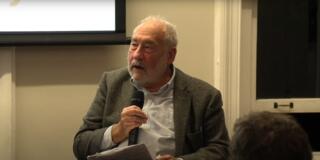The Way Forward for Industrial Policy

After falling out of favor for a period of time, industrial policy — government initiatives intended to foster innovation, expedite technological advancements, and support specific industries — is now returning to the policy agendas of officials in the the United States, Europe, and various developing nations. As interest in potential government intervention grows, policymakers need more and better knowledge to guide effective industrial policy.
A conference devoted to “New Thinking in Industrial, Innovation and Technology Policy: Perspectives from Developed & Developing Countries,” held at Columbia November 10, convened leading US and international researchers across disciplines including economics, sociology, and engineering. The goal was to assess existing knowledge and identify areas for further exploration regarding interventions, empirical assessments, and challenges faced by practitioners in the field.
The event was hosted by SIPA’s Center for Development Economics and Policy in partnership with the University’s Center for Political Economy.
All told, the conference featured a dozen keynote speeches and breakout sessions that touched on diverse issues. This is just a sampling of the presentation topics:
- How do Placed-based Policies Work?
- Colocation of Production and Innovation: Evidence from the United States
- Women in Science: The Lost Mothers of the Baby Boom
- The Need for Corporate Guardrails in the U.S. Industrial Policy
- Innovation Networks and R & D Allocation
Every country has an industrial policy. The question is whether it's explicit, whether it's implicit, whether it's coherent, or whether it's incoherent.
— Joseph Stiglitz
Speaking at the event’s closing panel (“The Way Forward”), University Professor Joseph Stiglitz talked about the resurgence of industrial policy, touching on both theory and implementation. He applauded the renewed attention to the matter but also suggested that industrial policy had not been not as dormant as some might suggest.
“Every country has an industrial policy,” he said. “The question is whether it's explicit, whether it's implicit, whether it's coherent, or whether it's incoherent.”
Stiglitz decried the notion that markets inherently lead to efficient allocations, and highlighted the importance of understanding market failures in designing effective industrial policies.
In closing, Stiglitz raised the question of how to evaluate the success of industrial policies. He advocated for a broader approach that considers societal impacts beyond traditional metrics like GDP, underscoring the need for more comprehensive ways of judging the effectiveness of interventions.
“How you evaluate success is very complex,” he said. “It's not just material well-being — it's how well people live, what kind of lives they have, what kind of society they have.”
Watch the complete event | View individual sessions